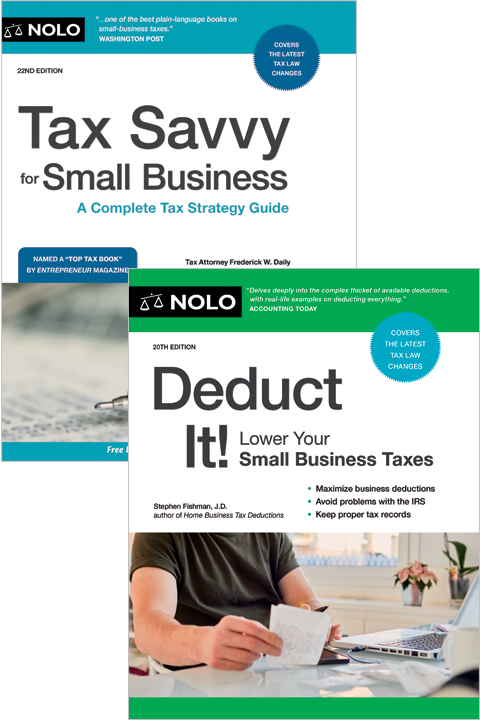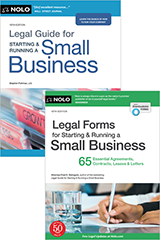Nolo's Small Business Tax Bundle
- Bundle Products
- Business Tax FAQs
- directly related to the business and business is discussed at the event -- for example, a catered meeting at your office; or
- associated with the business, and the entertainment takes place immediately before or after a business discussion.
Does incorporating a small business start-up offer tax breaks?
There can be tax benefits to incorporating, but they go mostly to profitable, established corporations, not to start-ups in their first few years. For example, corporations can offer more tax-flexible pension plans than sole proprietors or partnerships, but few start-ups have the cash necessary to take advantage of these tax breaks.
Similarly, the ability to split income between a corporation and its owners, which lets you keep some income in lower corporate tax bracket, is attractive only if the business is solidly profitable.
I drive my own car on business errands Can I deduct travel expenses?
If you use your car for business, you can deduct some of the costs of keeping it on the road.
You can either keep track of and deduct all of your actual business-related driving expenses, or use the much easier “standard mileage rate” method. The latter lets you deduct a certain amount (the standard mileage rate) for each mile driven, plus all business-related tolls and parking fees. In 2012, the standard mileage rate is 55.5 cents per business mile driven.
If you use a newer car primarily for business, the actual expense method provides a larger deduction at tax time; you can also deduct depreciation on the vehicle. To qualify for the standard mileage rate, you must use it the first year you use a car for your business activity. You can't use the standard mileage rate if you have claimed accelerated depreciation deductions in prior years or have taken a Section 179 deduction (deducted the entire cost in one year) for the vehicle.
If your auto is used for both business and personal use, only the business portion produces a tax deduction. That means you must keep track of how often you use the vehicle for business and add it all up at the end of the year. Certainly, if you own just one car or truck, no IRS auditor will let you get away with claiming that 100% of its use is related to your business.
Can I deduct the cost of taking a customer to dinner?
If you pick up the tab for entertaining present or prospective customers, you may deduct 50% of the cost if it is either:
On the receipt, always make a note of the specific business purpose -- for example, “Lunch with Jennifer Haight of AXLOM to discuss shipping contract.”
I am hiring people to help out with a big job coming up. Are they independent contractors or employees?
If you will be telling these workers where, when, and how to do their jobs, the IRS will classify them as employees. Generally, you can treat workers as independent contractors only if they have their own businesses and offer their services to several clients -- for example, a specialty sign painter with her own shop or a freelance designer who works for many clients. If in doubt, err on the side of treating workers as employees.
While classifying your workers as contractors can save you money in the short run (you don't have to pay the employer’s share of payroll taxes or have an accountant keep records and file payroll tax forms), it may get you into big trouble if the IRS later audits you. The IRS may reclassify your “independent contractors” as employees and assess hefty back taxes, penalties, and interest against you.
Can I deduct the entire cost of a new computer, or do I have to use depreciation?
You may be able write off the full cost of an asset in the year you buy it, rather than capitalizing it and deducting its cost over a number of years.
Section 179 of the Internal Revenue Code allows you to deduct up to $139,000 of the cost of new equipment or other assets in 2012. This is subject to a phase-out if you place more than $560,000 of equipment in service. Some assets don't qualify for this Section 179 deduction, including real estate, inventory bought for resale, and property bought from a close relative.
For tax years 2010 through 2012, there is also a first-year bonus depreciation deduction. This special deduction allows taxpayers to depreciate an additional 50% or 100% of the adjusted basis of qualified property during the first year the property is placed in service. This deduction can be taken in addition to the Section 179 deduction and offers tremendous tax savings. For calendar year 2012 (and January 1, 2010 through September 8, 2010), the first-year bonus depreciation amount is 50%. For September 9, 2010 through the end of calendar year 2011, the first-year bonus depreciation was 100%.



